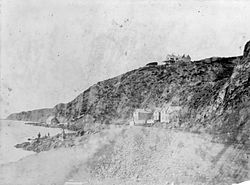James FitzGerald (New Zealand politician)
[5] FitzGerald gradually became concerned with the alleviation of poverty, an interest spurred by the problems of the Great Famine of Ireland.The settlement was well organised by the Canterbury Association; the printing press for the colony's newspaper was sent with the First Four Ships (FitzGerald becoming the first editor of the Lyttelton Times) and the main building for the settlement's school, known these days as Christ's College Big School, was designed by FitzGerald in 1850 in England.Godley declined,[7] and in July 1853, FitzGerald, Colonel James Campbell and Henry Tancred contested the election.[10] A major part of his work as Superintendent was an attempt to increase Canterbury's self-government, drawing the province's "cabinet" from the elected Council rather than appointing it himself.The acting Governor, Robert Wynyard, eventually agreed to appoint FitzGerald, Henry Sewell, Frederick Weld, and Thomas Bartley to the Executive Council.[3] Instead, he left Lyttelton on 30 September on the James Gibson for Sydney[12] and returned to England, where he resumed his work for the Canterbury Association.During his time in England, he was offered governorships of both British Columbia and Queensland, but his ill health prevented him from accepting.[15] In Parliament, he strongly advocated peaceful negotiations in the New Zealand Wars, supporting Māori rights and condemning land confiscation as an "enormous crime".FitzGerald strongly believed that if Māori and colonists did not make a deliberate attempt at reconciliation, one or both would eventually be destroyed.[16] In 1865, he had a two-month term as Minister of Native Affairs in the government of Frederick Weld (another colleague from the first provisional cabinet), but did not succeed in implementing many of his policies.

James FitzGerald (disambiguation)The HonourableMinister of Native AffairsNew Zealand ParliamentLytteltonEllesmereCity of ChristchurchSuperintendent of Canterbury ProvinceWellingtonRichard FitzgeraldLucius O'BrienGerard FitzgeraldNew Zealandpremierhis successorSuperintendentCanterbury ProvinceChrist's CollegeRoyal EngineersBritish MuseumGreat Famine of IrelandCanterbury AssociationAnglicanChristchurchFirst Four ShipsLyttelton TimesChrist's College Big SchoolCharlotte JaneJohn Robert GodleyJames CampbellHenry TancredIndependent1st New Zealand ParliamentLyttelton electorate2nd New Zealand ParliamentGovernorRobert WynyardHenry SewellFrederick WeldThomas BartleyDillon BellLegislative CouncilBritish ColumbiaQueenslandMatoakaCanterbury Provincial CouncilThe PressThomas RowleyEllesmere electorate12 July 1862 Ellesmere by-electionCity of Christchurch electorateNew Zealand WarsNew Zealand Settlements Act 1863Treaty of WaitangiGerardHokitika electorateOriental BayMennell, PhilipWikisourceMcIntyre, W. DavidDictionary of New Zealand BiographyMinistry for Culture and HeritageChristchurch City LibrariesHeritage New ZealandLee, SidneyDictionary of National BiographyScholefield, GuyMember of Parliament for LytteltonCrosbie WardMember of Parliament for EllesmereJohn HallJohn Cracroft WilsonMember of Parliament for ChristchurchWilliam TraversWilliam Sefton MoorhouseWalter MantellAndrew RussellAlfred BarkerEdward BishopCharles BowenJames Temple FisherBenjamin MountfortHarriet RitchieJames Stuart-WortleyCressyHarry AllwrightArthur Dudley DobsonEdward DobsonBenjamin DudleyMichael HartJames TownsendMary TownsendRandolphIsabella WilliamsSir George SeymourJohn Anderson SrJohn Anderson JrGuise BrittanEmily FosterRichard James Strachan HarmanHenry JacobsElizabeth Watts-RussellJohn Watts-Russell